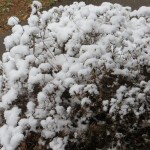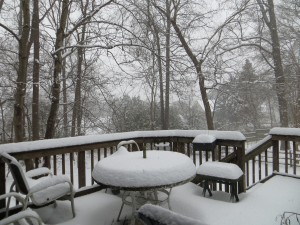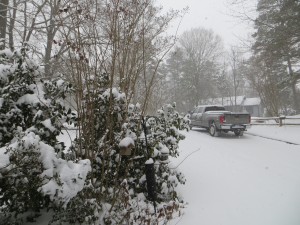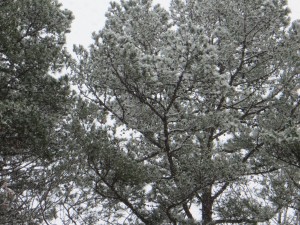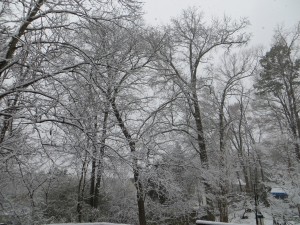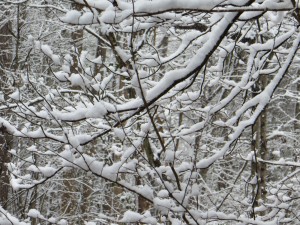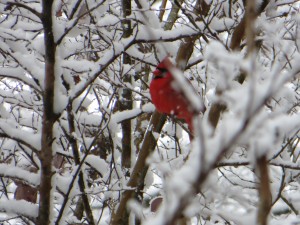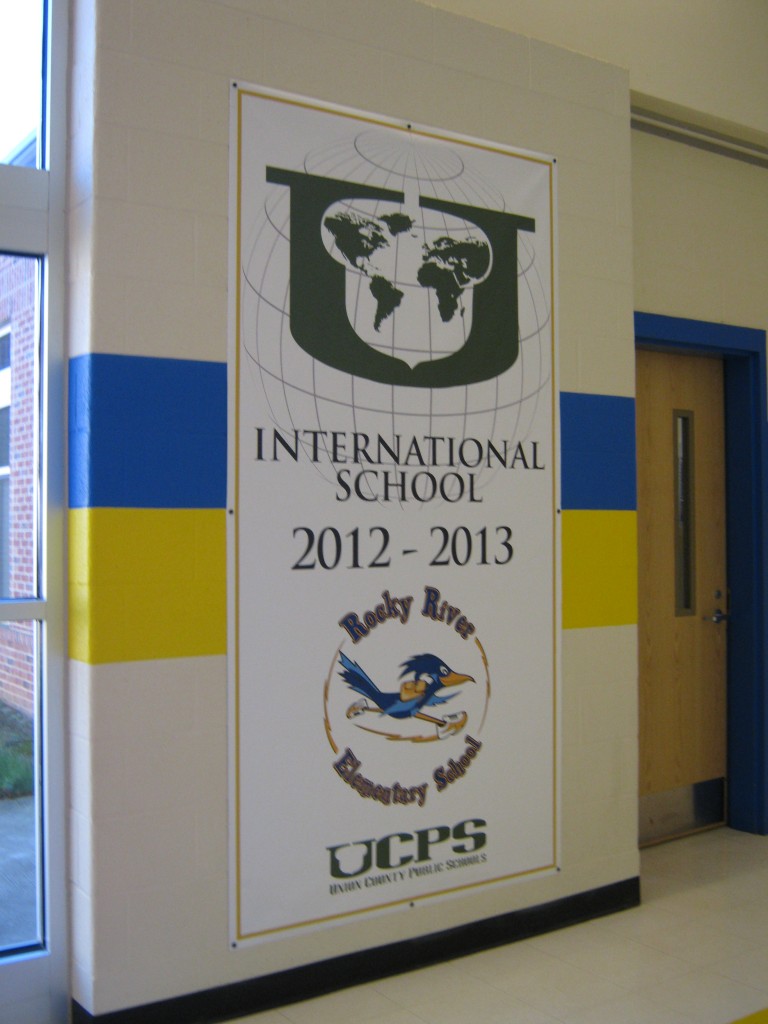 Once again we had an early dismissal on Tuesday at 10:30 because of snow coming. Then on Wednesday and now for Thursday no school. We are having a very hard time getting our planned projects done. Our Biome project , our Water project and our National Parks projects are having lots of interruptions with time out of class. Of course, the kids are excited about the snow. The weatherman said this is something that happens here every 10-20 years. We heard that with the Olympics in Russia that they don’t need to wear jackets and yet here in the southern USA we keep getting snow and/or ice and lower temperatures.
Once again we had an early dismissal on Tuesday at 10:30 because of snow coming. Then on Wednesday and now for Thursday no school. We are having a very hard time getting our planned projects done. Our Biome project , our Water project and our National Parks projects are having lots of interruptions with time out of class. Of course, the kids are excited about the snow. The weatherman said this is something that happens here every 10-20 years. We heard that with the Olympics in Russia that they don’t need to wear jackets and yet here in the southern USA we keep getting snow and/or ice and lower temperatures.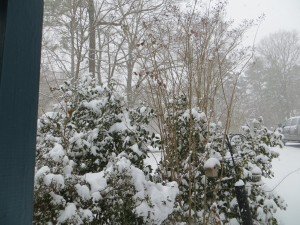
Community/North Carolina
Monroe, North Carolina
North Carolina
USA
Magazine Collaboration
Our blogging buddies from Upper Plenty have returned from their summer holidays. Right before their summer holidays and our winter break began we received our copy of a collaborative project. We were so excited to see our answers to the questionnaires included in this publication by Upper Plenty students , Ms. Crowther’s and Ms. Placek. The teachers had sent us questions to answer by email from the student groups to our teacher Mrs. Todd who then chose students to complete them from 3rd, 4th and 5th grade. A lot of collaboration was involved in completing the project around the world.
It was an absolute pleasure to receive a copy of Global UPdate fromMiss Crowther’s Class in Australia and we enjoyed looking at it when we returned. They had worked super-hard to meet their deadlines and publish their magazine. And what a very professional looking end product it is, too! We were so surprised by the awesome job they did with the publication to represent kids from all around the world. Some areas they focused on included school yard games, collections, literacy, math, music, teachers, and natural disasters.
The magazine was first introduced to students in Australia by the teachers at the beginning of Term 4. The magazine was to focus on similarities and differences of the lives of children from all around the world. After the students had all chosen a topic, they began their research. The research involved Skyping, blogging, emailing, interviewing and gathering information from books and the internet. The students spoke with students and teachers from all around the globe – from Japan, Monroe, NC, USA, China, India, Hong Kong, Germany, England and Canada.
The students said the project of “Writing our magazine has been a fun, rewarding and, at times, challenging task. It has involved a lot of hard work, dedication and enthusiasm to complete the magazine.” They had a launching party on December 18th, 2013 when they celebrated their hard work. A representative from the Red Cross came to speak with the students and thank them.
They sold the magazine and the money left over from having it published was donated to the Red Cross which helps kids around the world. We were happy to have had a part in this collaborative project and helping others at the same time! We look forward to more projects with students and classes around the world.
Water, Water, Everywhere
As we begin our new unit of study in 2nd grade we’d like your help. If possible can you answer a few questions so that we can compare water usage around the world.
- Do you drink tap water in your country/town/city?
- Do you clean it by boiling or filtering it?
- What ways do you use water in one day?
- Is water scarce or abundant where you live?
- Is it free?
- If not, how expensive is it?
- What ways do you have of conserving water?
- Where does your water come from?
- Do you have water fountains at your school to drink from?
- Do people in your country buy bottled water?
- Add anything else that might help us answer our compelling questions
Why is water important around the world and what can I do to help ensure everyone has clean water? How can I make a difference?
Habit Six and Seven
Habit 6 — Synergize
- Value other’s strengths
- Learn from them.
- Get along well with others, even people who are different than me.
- Work well in groups
- Seek other’s ideas to solve problems
- Team work create better solutions
- Together is Better!
Habit 7 — Sharpen The Saw
I……..
- Eat right
- Take care of body
- Exercise
- Get sleep
- spend time with family and friends
- Learn in lots of ways
- Learn in lots of places not just school
- Balance Feels Best
- I find ways to help others that is meaningful
Have you practiced these habits lately?
Habit Four and Five
 Habit Four- Think Win-Win – You can either choose a Win-Win situation and compromise so that both groups succeed or you can choose a Win-Lose where one is the winner and the other the loser or lose-lose where not one wins.
Habit Four- Think Win-Win – You can either choose a Win-Win situation and compromise so that both groups succeed or you can choose a Win-Lose where one is the winner and the other the loser or lose-lose where not one wins.
Habit Five- Seek first to Understand and then to be understood– Do you listen and figure out what the other person is saying before responding or do you only partially listen and then add a response?
Habits Two and Three
We each did a google drawing for the habits. If we were in Kindergarten and first grade Mrs. Todd typed what we said. If we were in second through fifth we typed our own so some words may be misspelled. We didn’t have time to add a picture. When we do these habits we look at our mission statement and vision and then we set our individual goals. For example if we can add numbers 1-10 we might then set our next goal to do numbers 10 – 20. Or if we are reading at a level 20 then we might set it to read at a level 24 next time. We are working on Begin with the End in Mind and knowing where we want to be in the future. Some of us are focused only on this year and some are looking at the far off future.
Begin with the End in Mind
What goals do you see for yourself in five years, ten years, even 20 years?
Set Goals
Plan– where do you want to be and what do you want to do in the future?
Habit Three
Put First Things First
- I spend my time on things that are most important.
- This means I say no to things I should not do.
- I set priorities.
- Make a schedule
- Follow my plan.
- I am organized
- I get important things done.
- I enjoy doing certain things to relax but I need to not do them to much.
Are you successful with Habit Three- Put First Things First
7 Habits -Leader in Me
Rocky River students and staff are learning all about the 7 habits and being leaders. Stay turned next week to see what the students think each habit means for kindergarten through fifth grade students. Each day we will explain one of the habits. See if you do these things in your daily lives.
Habit 1- Be Proactive
Habit 2- Begin with the End in Mind
Habit 3- Put first things first
Habit 4- Think Win-Win
Habit 5- Seek First to Understand, Then to be Understood
Habit 6- Synergize
Habit 7- Sharpen the Saw
If you are a leader in me school we’d love to hear from you also. There are Leader in Me schools around the world so let us know who you are.
Rocky River Elementary designated as International School in UCPS!
We’re So Proud and Excited!
Recently at a principals meeting Union County Schools were recognized for their globalization efforts for 2012-2013 school year. The staff got the news that our school (Rocky River) was awarded the designation in Union County as an International School for 2012-2013 at a staff meeting and we are excited and proud of this accomplishment. In order to obtain this designation each school submitted a livebinder presentation showing their globalization efforts throughout the school year then a committee went through the rubric criteria and gave points which were then totaled up and schools were awarded designation for their work throughout the year. International School is the highest award a school can obtain. You needed above 85 points for this category. Rocky River exceeded that total with an average of 96 points. These are the categories awarded throughout the county. Just the year before we were a Global Partners School with 84 points.
- UCPS International School 85+ points
- UCPS Global Partners School 60-84 points
- UCPS Global Affiliate School 45-59 points
- UCPS Goodwill Ambassadors School 35-44 points
- UCPS Global Education School 1-34 points
Throughout the county there were 19 elementary, middle and high schools in the International category. Our globalization committee is pictured above with the plaque we received. Below is the banner which is hanging proudly in our main hall.
Some areas to get points for included International Sister Schools (England and Australia), Cultural Awareness Projects (Irish Dancers and Jaars – Brazil presentation), Speakers ( Vietnam, Canada, Sweden, New Zealand, and Colombia), 21st Century Technology ( Voice Threads, Google Docs, Skyping etc., 21st Century communication (Skyping, Blogging, emails, PowerPoint and Professional Development (globalization), classroom web pages, classroom activities highlighting focus countries for each grade, Environmental projects, Service Projects ( Heifer foundation/Beatrice’s Goat. Red Cross, Blood Drives, Relay for life and others), and the UCPS global teacher leaders program and Global gateway program with Professional Learning modules).
We couldn’t have done a lot of this without our ties with others in England and Australia and around the USA. A Room with a View (Middleham, England http://aroomwithaview.edublogs.org/ ) and Upper Plenty-http://upps45p.global2.vic.edu.au/ and Áine Murphy – Pt Lonsdale Primary School in Australia, along with Stephen in New Zealand were always eager and helpful in doing joint projects together. From Skyping to learn about a field trip to London, learning about holidays and customs in Australia and England, reading books and comparing our thoughts (The Boy Who Biked the World, Flat Stanley and Magic Tree Houses books and Julia Donaldson books) were enjoyed by students at Rocky River and our sister schools. We learned about Superstition Mountain and legends, we learned how to sign the Pledge of Allegiance with buddies in Arizona http://blogs.goaj.org/gfraher/
This year we are continuing our learning with other students around the world and we continue to enjoy this a lot. Thank you to everyone that continues to join us in our global learning experiences! Thank you to everyone who helped make this designation possible for our school both locally and internationally.
What do you do to be a global learner?
We are looking forward to 2014 and delving into some global issues around the world. If you have any projects you be interested in joining us on let me know. Water, poverty, environmental, hunger…….
Holidays Around the World
The past few weeks have been busy while the students learned about several Festivals of Light celebrations and holidays celebrated at this time of year around the world. This is some things they remembered from this unit of study.
- We watched and learned about Loy Krathong in Thailand. Getting rid of bad luck and keeping good luck. The lanterns floating into the sky and the candles in the shells were spectacular. Awesome boats too. Some looked like dragons, some had trees and many, many lights.
- Then went on to India to see Diwali celebrations. They like to have prosperity. They shop for gold and things to use in cooking the meal. The women dress up in silk. They go shopping at lot. The fireworks were bright and big. There were 5 days of festivities.
- After that it was Sweden for St. Lucia celebrations. The students thought the girls with the candles on their head looked dangerous if it fell over. The snow was high in Sweden and it looked cold.
- We then learned about Las Posadas in Mexico. This is about the trip Mary and Joseph made to find an inn to stay in. The children travel from one house to another asking for shelter. Finally they are allowed into someone’s house.
- After that we learned about Hanukkah and Kawanza celebrations. Hanukkah is celebrated by the Jewish people because in Israel they couldn’t celebrate like they wanted then they could. They light the menorah and play a dreidel game. With Kawanza they celebrated with family and friends the day after Christmas until the first of January. They give each other a gift and they like dancing. They light the kinara . It has red, green and black candles. They have 7 habits one for each day with the first one unity.
- We finished up our study of Holidays with Christmas in Europe, Australia and the United States. Although some celebrations and traditions were similar others were different. It’s summer in Australia so their celebrations include beaches, water, surf boards and Santa in a swimsuit with white kangaroos’s driving his ute (truck). We found this to be different from our Santa and Jingle Bells song with Reindeer and a man in a red suit with black boots. Some people go to church and celebrate the birth of Jesus. They sang carols. Others do special meals and baking and cooking with family and friends. They have Santa which is sometimes called St. Nick, Santa Claus, Noel in different places. They decorate trees and put lights outside. It is a time of giving.
#5, 6, 7- Christmas Carols and Songs, Church Plays and Services, Christmas Stories
Other traditions we like to participate in are Christmas plays and services at church. Local churches have Walks through Bethlehem to walk through and children sing in choirs and perform plays. Some of us play music on the piano that is Christmas songs.
We also like to sing Christmas Carols and Songs. Some of our favorites include……….
- Silent Night
- Deck the Halls
- Away in the Manager
- What Child is This
- Joy to the World
- Jingle Bells
- Frosty the Snowman
- I Saw Mommy Kissing Santa Claus
- We Wish you a Merry Christmas
- Rudolph the Red-Nosed Reindeer
- What are some of your favorites?
- Does your class have a Christmas program or play?
- We do not since some of us do not celebrate and some of us celebrate other things. We do plays at our Churches and sing in children’s choirs there.
- What is your favorite Christmas story? We watch many on TV leading up to Christmas time. We read others at school.
#4- Baking Cookies
We love to bake cookies. Some of us decorate them with icing and candies. We make Gingerbread Houses with icing and graham crackers and candies.
We bake shape cookies. We love to eat warm cookies and dip them in milk. We bake with our moms and grandmas. We get flour all over the place sometimes. We stir and mix them. Then we put them on a pan and put them in the oven. Don’t cook them to long or they get hard and brown like rocks.
Have you read “If you give a Mouse a Cookie” or “Who Stole the Cookies from the Cookie Jar”? What other books are there about cookies?
What is your favorite cookie?
- Peanut Butter Cookies
- Chocolate Chip Cookies
- Molasses Cookies
- Sugar Cookie
- Ginger Snaps Cookies
- Chocolate Oatmeal Cookies
- Oatmeal Cookies
#3 – Decorating Our Houses
We like putting up outside lights and wreaths with red bows on our houses on shutters and doors.
We put candles in the windows to light at night.
We put greenery inside the house. We hang stockings by the fireplace if we have one. We hang mistletoe.
We put out other holiday decorations.
We hang wreaths on the door.
We put a red bow on the mailbox.
What do you decorate with?
Do you have lights outside? We put them on trees and bushes and around the roofs and porches of our house.
Tradition #2- Holiday Cards
One of my favorite Christmas time traditions is preparing, addressing and mailing out Christmas cards to family and friends. It is also great to anticipate and receive the daily delivery of cards everyday when the postman arrives. Sending someone a card to wish them well on the religious holiday they celebrate is meant as a happy greeting.
- Christmas cards. Sending and receiving Christmas cards is a way to communicate with our friends and loved ones who live near and far letting them know that you are thinking of them and hoping for their best during the Christmas holiday season. Within the United States of America, there are more than two billion Christmas cards exchanged annually. Christmas is the number one card-selling holiday of the year. The phenomenon began around 1822 in America. Cards are also being sent electronically in today’s world. Nothing compares of a handwritten signature and note wishing happiness for the season and next year.
-
- The first American to print and sell Christmas cards was Louis Prang of Roxbury, Massachusetts, who began publishing cards in 1875.
- President Dwight D. Eisenhower is given credit for sending the first “official” Christmas card from the White House.
- Hanukkah, Las Posadas , and Kwanzaa Cards are also sent to friends and family as they celebrate in our classes. Cards can be bought at many stores. Hallmark Card Stores, e-cards, Shutterfly cards made on line, cards from Target, Wal-Mart, CVS and even grocery stores are places to purchase greeting cards throughout the year.
Being part of another’s celebration can only enhance your own. People of any faith can marvel at the beauty of a Christmas service or midnight mass. The wisdom and customs of Kwanzaa can be uplifting to all. An unfamiliar Hanukkah party can be a chance to bask in candlelight, eat delicious latkes and learn how to play dreidel. If you’re invited to new celebrations, by all means go! Your presence will be a great show of respect to friends and/or extended family.
Our big, beautiful world is filled with variation in thought and customs. Embracing those differences doesn’t mean diluting your own treasured beliefs and traditions. Celebrate and let celebrate! It’s all good—and we’re good, too, when we offer acceptance and tolerance. Families and countries are a blend of many cultures and traditions.
We started receiving our Holiday Cards this week from other schools with our Projects by Jen. So far we’ve gotten one from New York, Missouri and Ontario, Canada. The students get excited each time we open one. Ours will be mailed out tomorrow when we finishing putting them together. We have 60 cards heading out in the postal mail. Who will be the first one to get one from us? Where will the farthest one travel?
Christmas Trees- Traditions in our Homes
 Our first tradition we thought of is the Christmas Tree. Some of us went out this past weekend and picked a special tree from the tree farm on Choose and Cut Day and tied them to the top of our cars to haul home. Some of these trips involved sleigh rides /hayrides to the mountains. Some were nearer to us in the Piedmont. Some of us stopped at a local tree lot set up on a corner near our home and picked one and tied it on top. Others of us get the tree out of the attic or garage and put it in our house already with lights on it. They are not real. They don’t need water. They don’t smell good.
Our first tradition we thought of is the Christmas Tree. Some of us went out this past weekend and picked a special tree from the tree farm on Choose and Cut Day and tied them to the top of our cars to haul home. Some of these trips involved sleigh rides /hayrides to the mountains. Some were nearer to us in the Piedmont. Some of us stopped at a local tree lot set up on a corner near our home and picked one and tied it on top. Others of us get the tree out of the attic or garage and put it in our house already with lights on it. They are not real. They don’t need water. They don’t smell good.
Then it’s time to decorate our trees. Some of us have more than one tree in our house. Some of us have none because we don’t celebrate Christmas. Some of us have only one in the family room. We put on lights, we add ornaments some of them favorites from many years of collecting just right ones. Some belonged to our parents when they were little. A few came from grandmas/grandpas. Some came from special trips we made. We added tinsel and some added popcorn or berry garland we made. Some put angels on top and some put stars on top. Some had white lights, some red or green or blue lights. Some had multi-colored on the same tree. They are tiny little lights.
There are many kinds of trees used in America but these are common ones.
| Firs | Pine | Spruces | ||||||
|
Douglas |
Balsam |
Fraser |
Scotch |
White |
White |
Norway |
Blue |
|
- What kind of tree/plants do you use? Do you see the same types in homes in your country?
- What is your favorite ornament for the tree?
History of Christmas Tree—Early British settlers to North American colonies rarely observed Christmas and did not cut down or decorate trees. Pennsylvanian German settlements had community trees as early as 1747. Germany is credited for the decorated Christmas Tree as we know it.
Decorations were still of a ‘home-made’ variety in 1747 . Young Ladies spent hours at Christmas Crafts, quilling snowflakes and stars, sewing little pouches for secret gifts and paper baskets with sugared almonds in them. Small bead decorations, fine drawn out silver tinsel came from Germany together with beautiful Angels to sit at the top of the tree. Candles were often placed into wooden hoops for safety. Decorations today have changed from ‘home made’ to store bought in many homes.
In early America, Christmas trees were considered a quaint foreign custom. America was so geographically large, that it tended to have ‘pockets’ of customs relating to the immigrants who had settled in a particular area. It was not until the telegraph communications really got going in the 19th century, that such customs began to spread. Thus references to decorated trees in America before about the middle of the 19th century are very rare. But by 1850, the Decorative Christmas trees came forth. They were embellished with fruits, nuts, tiny wafers, paper cuttings and small candles. Christmas tree had become fashionable in the eastern states.
Before the war the tree lost popularity then after World War II, the Christmas tree again became popular!
The first national American Christmas Tree was lighted in the year 1923 on the White House lawn by President Calvin Coolidge. A tree from the National Christmas Tree Association has been displayed in the Blue Room of the White House since 1966.
In 2002, 21% of United States households had a real tree, 48% had an artificial tree and 32% had no tree. There are many debates about whether you should buy a real tree or an artificial tree.
What is your opinion and why?
Projects by Jen
We are getting excited to start our newest project with the Holiday Card Exchange project.
Welcome to the
Holiday Card Exchange Project
Dates of Project:
December 2 to 20, 2013
THIS YEAR’S THEME:
MITTENS, HATS, & SCARVES
This project will be open to all PreK – 6th grade classes around the world.
We can’t wait to see who we get a card from. Check back with us to see who sends us a card.


